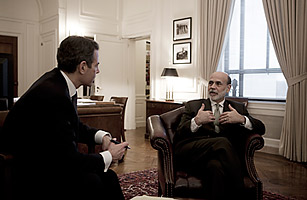
TIME's Managing Editor Richard Stengel talks with Federal Reserve Chairman Ben Bernanke during an interview in Washington, DC
(3 of 12)
Currently, we are in much better shape than we were in the fall of 2008. Most of the financial markets are functioning more or less normally. The stock market has recovered significantly from its lows in March 2009. The corporations are able to borrow through bond issues, for example, or by raising new stock, by selling new stock on the stock market. The banking system has been stabilized, and we no longer fear the collapse of large banks.
But bank lending is still weak. The banks had a near-death experience, they are now lending in a difficult economic environment. We are strongly encouraging them to lend. We have taken a lot of steps to help them raise new capital, so they'll have a basis on which to make new loans. And we are taking a number of steps to try to open up markets through which investors invest directly in various forms of credit, like auto loans and credit card loans. All of these steps are improving the financial situation, but particularly the banking sector, we're still in the convalescent stage.
I think it's important for me to go back to make a couple of general observations about this whole episode. The first is that, again, going back to my own background. I was raised in a small town in South Carolina. My father and his brother ran the town drugstore. This town was a very — still remains — very economically challenged. It has a high unemployment rate, and my former home where I was raised was recently foreclosed upon. I have a good sense of the difficulties that Americans are facing in this current environment.
As I said, I was a professor. I never worked for Wall Street. I have no connections on Wall Street. In fact, when I first became chairman, I was criticized in some quarters for not being close enough, or knowing enough about Wall Street. So, why did I take these actions?
I didn't take these actions, or the Federal Reserve didn't take these actions because we were trying to help bankers, or trying to help Wall Street. What I understood, and what knowledgeable people all around the world understood, is that the financial system is essential to the functioning of any economy. And that if the financial system had collapsed to the extent to which we believed was very likely in September and October 2008, then no force on earth, no policy, could have prevented the collapse of the entire U.S. economy with long-lasting and extreme consequences for every American. It was because we were concerned about jobs and incomes and the economic well-being of every American that we intervened to prevent the collapse of the financial system.
Now, going forward, we have a lot to do to get the economy back to stability, get jobs created. You can talk as much as you like about the things we're doing there, but we're also going to have to take some very strong steps to make sure that the crisis doesn't ever happen again.
There were, certainly, weaknesses in our financial regulatory system. There were weaknesses in the way that financial regulators supervised the banks and other financial institutions. And the financial institutions themselves made lots of mistakes in terms of their ability to measure the risks that they were taking, and to control them properly. And to make sure we don't ever have a crisis like this again, we need to have extensive reform in the private sector, in the public sector, to eliminate these risks in the future.
You had said that the banks were convalescent still, Mr. Chairman. Can you talk to us a little bit more about what that means?
Well, the banks have been stabilized. They've raised a good deal of capital, so they're in much better shape than they were. They are lending, but they are not lending enough to support a healthy recovery. One important reason for that, is that given their losses, given what they've been through, they're being very conservative in the face of what is still a very weak economy; and, therefore, a sense that many borrowers are quite risky.
As bank supervisors, we have a difficult challenge. We have told the banks very clearly that we want them to make loans to credit-worthy borrowers, where there are borrowers who can repay the loans. It's in the interest of the banks, it's in the interest of the economy, and, of course, it's in the interest of the borrowers for those loans to get made.
But the problem is, of course, that we got into trouble in the first place by banks making loans that couldn't be repaid, so we don't want banks to make bad loans. Therefore, we are trying to work with banks to make sure that they are, in fact, able to make as many good loans as possible, that they have enough capital, that they have enough short-term funding, and that the examiners and the regulators who work with the banks are not unduly restricting the loans that they make. We want to work with the banks to make sure that they balance the appropriate prudence and caution against the need to make good loans for the economy, and for their own profits.
That was an incredibly comprehensive answer.
(Laughter.)
That was an open-ended question.
I offered to stop. (Laughter.)